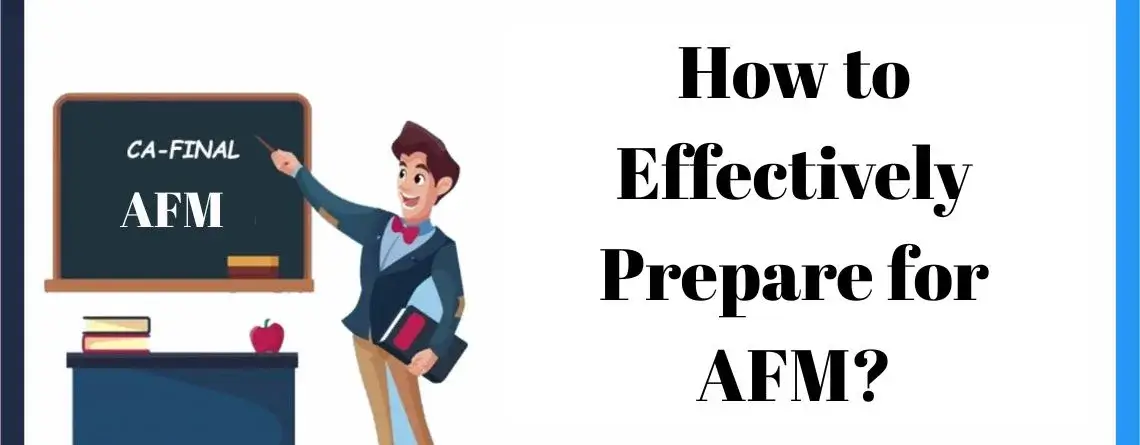How to Effectively Prepare for AFM (Advanced Financial Management)
AFM (Advanced Financial Management) is one of the most important and core subjects of the CA Final course under the new syllabus. As a part of Group-I, it requires a highly practical approach along with conceptual clarity, market awareness, and strong analytical skills.
While the subject has evolved from the older syllabus’ SFM (Strategic Financial Management), it remains one of the most scoring subjects when approached strategically. With smart planning and consistent effort, AFM can open doors to high-level careers in corporate finance, investment banking, and strategic advisory roles.
Introduction:
As the name suggests, Advanced Financial Management involves strategic financial decision-making at the senior management level. It includes topics that are not only relevant for the CA Final exams but also for real-life applications—such as managing your stock portfolio, analyzing mutual funds, valuing businesses, and making strategic investment decisions. These topics are central to your future role as a financial consultant, planner, or CFO.
AFM equips you with in-depth knowledge of financial markets, instruments, risk mitigation, and valuation techniques, making you a vital decision-maker in any organization. Strategic decisions like M&A, business expansion, international funding, and startup investments are a few real-world applications you will master through this subject.
New Syllabus Chapters:
The AFM syllabus includes the following chapters:
- Financial Policy and Corporate Strategy
- Risk Management
- Advanced Capital Budgeting Decisions
- Security Analysis
- Security Valuation
- Portfolio Management
- Securitization
- Mutual Funds
- Derivatives Analysis and Valuation
- Foreign Exchange Exposure and Risk Management
- International Financial Management
- Interest Rate Risk Management
- Business Valuation
- Mergers, Acquisitions and Corporate Restructuring
- Startup Finance
The updated syllabus integrates several new-age topics such as startup finance, securitization, interest rate risk, and a more structured approach to valuation and derivatives, making it even more industry-relevant.
Join: CA Final AFM Classes
Approach for Effective Study
Understand the Big Picture
Think like a CFO or business strategist. Understand why a financial decision is being made, not just how it is made. This mindset helps in grasping the practical essence of each concept.
Time Value of Money
This principle applies across the syllabus. Be quick in identifying the core requirement of a question, especially when using discounting techniques or IRR-based decisions.
Risk vs Return
Always assess financial decisions by considering the risk-return trade-off. Many AFM questions are based on analyzing risks and recommending strategies to optimize returns.
Smart Study
Due to time limitations, pair heavy topics like Derivatives or Valuation with lighter ones like Mutual Funds or Securitization. This helps in maintaining study momentum.
Leverage Online Resources
If you’re unable to access metro-city level coaching, go for live online or Pendrive classes by reputed faculty. These are now widely available and effective.
Don’t Skip Topics
Even the smallest chapter can hold the key to unlocking difficult integrated questions. ICAI often connects concepts across chapters in exams.
Practice Strategically
Focus on Practice Manuals, RTPs, MTPs, and past year papers. Use curated study material from a good coaching institute to avoid time wasted juggling multiple sources.
Mock Exams
Simulate real exam conditions and evaluate your speed, accuracy, and time allocation across sections. The final 3 hours in the exam hall are what all your preparation comes down to.
Read Also: ICAI CA Final MTP (Mock Test Paper)
Practical Orientation:
AFM covers topics directly linked to capital markets, startup ecosystems, international finance, and modern instruments like derivatives. Therefore, stay updated with current financial events. Doing so will strengthen your conceptual clarity and eliminate the need for rote memorization.
In addition, formulas in AFM can seem daunting. Instead of memorizing them blindly, understand their derivation and application. This approach not only makes recall easier but also enables you to tackle twisted questions confidently.
One strong strategy is to follow a heavy-light pattern — study a demanding chapter like Derivatives followed by a lighter one like Startup Finance or Mutual Funds. This balances your energy levels and helps complete the syllabus efficiently.
Read Also: Who is the Best Faculty for CA Final? Subject-Wise
Conclusion:
To sum it up, AFM is not a subject to be feared—it’s a subject to be understood and applied. Though considered challenging due to the variety of models, calculations, and concepts, it becomes manageable and even enjoyable with proper planning, practical exposure, and expert guidance.
Success in AFM lies in:
- Building strong concepts,
- Practicing relentlessly,
- Applying smart strategies, and
- Studying from updated and comprehensive materials.
Choose the right mentor, manage your time wisely, revise thoroughly, and approach the paper with confidence. Remember: everyone works hard, but those who combine smart work with effort rise above the rest.
Wishing you all the best for your AFM preparation and your journey to becoming a Chartered Accountant!
This blog was originally written when the subject was called Strategic Financial Management (SFM). It has now been updated as per the latest ICAI syllabus under the name Advanced Financial Management (AFM).












Leave a Reply